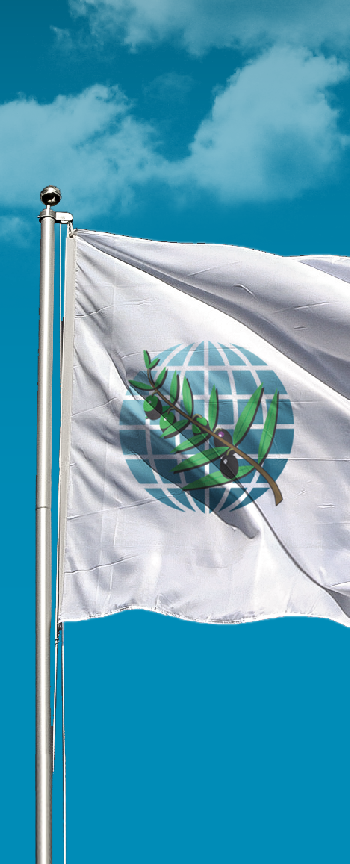Mission (Who we are)
The International Olive Council is the world’s only international intergovernmental organisation in the field of olive oil and table olives. It was set up it Madrid, Spain, in 1959, under the auspices of the United Nations. It used to be known as the International Olive Oil Council or IOOC until 2006, when its name was changed.
The Council is a decisive player in contributing to the sustainable and responsible development of olive growing and it serves as a world forum for discussing policymaking issues and tackling present and future challenges. It does so by:
- Encouraging international technical cooperation on research and development projects, training and the transfer of technology.
- Encouraging the expansion of international trade in olive oil and table olives, drawing up and updating product trade standards and improving quality.
- Enhancing the environmental impact of olive growing and the olive industry.
- Promoting world consumption of olive oil and table olives through innovative campaigns and action plans.
- Supplying clear, accurate information and statistics on the world olive and olive oil market.
- Enabling government representatives and experts to meet regularly to discuss problems and concerns and to fix priorities for IOC action.
- Working in close partnership with the private sector.
Its current membership Members includes the leading international producers and exporters of olive oil and table olives. IOC producer Members account for around 94% of world olive oil production, located primarily in the Mediterranean region.
The IOC is commited to the integrated, sustainable development of world olive growing. It attemps to translate this commitment into tangible advancement for its Member countries and, most importantly, for the ordinary people who earn their livelihood from the produce of the olive tree.

Basic texts
The International Olive Council was set up in 1959 to administer the succession of international commodity agreements concluded over the past sixty years to defend and promote olive growing, olive oil and table olives.
In all, it has administered six international commodity agreements, the most recent of which came into force on 1 January 2017/2015 Agreement (See also ERRATUM).

Background
1956 Agreement
The first International Olive Oil Agreement was adopted on 17 October 1955 after negotiations convened in Geneva by the Secretary-General of the United Nations.
Like all the international commodity agreements, it was legally underpinned by Chapter VI of the Havana Charter, which adopted principles to help expand world trade. Its prime aim was to stimulate the international coordination of production, industrialisation and marketing policies in the olive sector and to stabilise and expand trade. It remained in force until September 1963.
The IOC was created in 1959 under this first Agreement. Its headquarters were established in Madrid, Spain, where it has been based ever since.
1963 Agreement
The second International Olive Oil Agreement was operational from October 1963 until December 1979. Like its predecessor, its chief aim was to stabilise and expand trade.
1979 Agreement
The third Agreement entered into force definitively in January 1981 and expired in December 1986.
It was the first international commodity Agreement to refer to Resolution I (III) of the United Nations Conference on a Common Fund under the Integrated Programme for Commodities. This Fund was later to play an important part in IOC action.
1986 Agreement
The 1986 Agreement marked a milestone in the life of the IOC. For the first time ever, the title of the Agreement mentioned not just olive oil but also table olives and incorporated specific references and measures for this product, which had always been overshadowed by olive oil. Technical and promotional activities were also strengthened.
2005 Agreement
It placed major emphasis on building closer relations with the private sector and bringing industry and institutional representatives together to work out solutions to concerns and issues in the olive sector. It attached even more importance to product quality, which is viewed since then as a key argument in promoting olive oil and table olives among consumers and in helping to balance supply and demand. Last but not least, environmental protection and conservation were considered as top priorities to improve the environmental impact of olive growing and the olive oil and table olive industry.
The 2005 Agreement remained in force until 31 December 2016.
2015 Agreement
The 2015 Agreement was negotiated at an international conference held in Geneva in October 2015 under the auspices of the United Nations Conference on Trade and Development (UNCTAD). The 2015 Agreement has come a long way from earlier Agreements and incorporates new, innovative features to help the IOC adapt to the changing demands of the olive sector and society.
The 2015 Agreement is shorter but more precise than its predecessor. Its objectives highlight the importance of enhancing the role of the International Olive Council as a world documentation and information centre on olive trees and their products and as a meeting point for all sectoral operators; they also highlight the importance of standardisation and research, information sharing and the olive economy. The objectives, however, still include the Organisation’s longstanding objectives of fostering technical cooperation and promoting olive products. This Agreement also seeks to integrate consumer countries in the Organisation. To this end, it introduces a new method for the calculation of quotas that takes imports into consideration.
Headquarters Agreement
Since its inception, the International Olive Council has signed three Headquarters Agreements with the Kingdom of Spain, the host country of the Organisation, governing the rights, immunities and privileges of the IOC headquarters, staff and representatives. The current one was signed on 28 November 2019.

